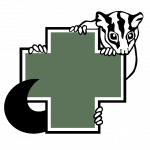RESCUE ADVICE
Adult Birds
Birds are the most common type of animal to come into care with Hunter Wildlife Rescue. The most common reasons adult birds may need rescuing include:
- Injured/can’t fly (e.g. injured wing, concussion)
- Domestic animal attacks
- Entanglement (e.g. netting)
- Dangerous location (e.g. on the road)
Handling and Transportation
Before attempting to capture a wildlife casualty, consider that wild birds can potentially transmit disease and inflict serious injuries and remember that your own safety is of paramount importance.
If you need to handle a wild bird, make sure you use gloves or a towel.
- Capture the bird as quickly as possible by throwing a towel or blanket over it
- Stay calm and keep domestic pets away
- Once captured, do not handle the bird unnecessarily
- Keep the bird upright and do not compress the chest
- Place it in a warm, dark and quiet place while you contact our hotline
If you are required to transport a bird, you will need a pet carrier or strong cardboard box with secure lid (wire cages are not ideal due to potential for stress and feather damage). The carrier/box should be large enough to hold the bird but small enough to prevent flapping. You will need to line the container with a clean towel or newspaper and provide ventilation (if cardboard).
Ensure that you secure the container – debilitated/unconscious birds can make sudden recoveries!
Protect the bird from excessive noise, vibration, extremes of temperature, wind, rain and direct sunlight whilst transporting.
Species specific considerations
Waterbirds
Do not put water birds (e.g. ducks), in water. An empty shower cubicle, without water, can be ideal for large, messy, waterbirds.
Parrots
Have very strong beaks and claws. They are best handled from inside a big towel. A firm grip of their head or neck as if you were holding a cup will prevent bites. Two people may be needed to handle the larger parrots.
Small birds
Need to be handled gently to prevent injury to themselves. Hold your hand in a “pistol grip”. The thumb and index finger hold the head, the others support the body.
Pigeons/doves
May drop feathers when handled. A firm hold over the flight and tail feathers or the shoulders may reduce feather loss.
Birds in swimming pools
Can be carefully scooped from the water. If this is impossible, place a board/branch from a tree or towel over the edge and into the water to give them something to grip to allow them to exit the water themselves.
Carefully dry with a towel and place immediately in a box with a bottle with warm water until they are fully dry.
Oiled birds
Oiled birds should be placed in a well-ventilated box, to avoid fume toxicity. Avoid contact with these birds as some chemicals can cause eye irritation and respiratory issues in humans. If you find a bird with oil on it, do not attempt to wash the oil from the bird. Instead, call our rescue hotline immediately.
